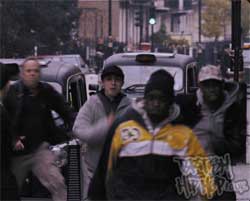Former music video and commercials director, Menhaj Huda directed and co-produced KiDULTHOOD. Menhaj Huda was involved in all aspects of the production and filmmaking. He had a clear idea of how he wanted Noel’s script to be portrayed, so that it was true to real life experiences and characters that Noel used to write the film – using specific artists and music within the film was a very important and integral part of this directing process.
Is KiDULTHOOD the first film specifically to address British street culture?
I had made a short film about eight years ago called Jump Boy, which touched on the same street culture. I had been looking to do a similar feature length project ever since. When I read the KiDULTHOOD script, I knew this was it. It’s the kind of film that I want to go and watch. It’s the kind of film that I’d seen from all sorts of other countries – from City of God to La Haine – but never from here. I know it exists in Britain. We have the potential to make films like this and there’s an audience sitting there just waiting. That’s why I wanted to do it.
What makes KiDULTHOOD such a different film?
![Menhaj Huda [Director, Kidulthood] Menhaj Huda [Director, Kidulthood]](https://www.britishhiphop.co.uk/wp-content/uploads/menhaj_huda.jpg) People have picked up on its lack of intrusion from any adults or parents in the film. That’s deliberate. It’s wriiten and visualised from the perspective of the kids. Ven when parents are around, they’re not within their kids’ field of vision. That disturbs people but that’s very real from a teenagers point of view.
People have picked up on its lack of intrusion from any adults or parents in the film. That’s deliberate. It’s wriiten and visualised from the perspective of the kids. Ven when parents are around, they’re not within their kids’ field of vision. That disturbs people but that’s very real from a teenagers point of view.
Was it difficult to get KiDULTHOOD up and running?
I optioned the script from Noel and started developing it with him. I was really interested in telling Noel’s story. I didn’t want to take it away from him. We started looking for money back in 2003. We put it out there and had a great reaction. It was on people’s radar pretty quickly.
How did you make the small budget work for you?
I challenge anyone to look at the film and tell us how much it cost to make! We shot it in four weeks on 35mm.
You are from West London, how important is the setting of the film?
I’ve lived in Ladbroke Grove/Harrow Road area for 15 years, which allowed me to know exactly what Noel was talking about and where the script was coming from, and our need to shoot around West London. Of course it was a dream to shoot a film on your doorstep every day! In fact we used the exterior of my flat in one shot… try and guess which one…
How did you find a new breed of actors?
 It was important not only to find a good cast but also who could really relate to the subject matter in one way or another. Right form the beginning we really went out to find the real ‘street’ kids who could act, rather than cast child actors to play ‘street.’
It was important not only to find a good cast but also who could really relate to the subject matter in one way or another. Right form the beginning we really went out to find the real ‘street’ kids who could act, rather than cast child actors to play ‘street.’
Intially we did a first round of casting in 2003 when it looked like the film might go through The Film Council and Film Dour. They asked us to do a read through – and we ended up casting the film for that. We met about four hundred kids in open castings and sifted them through improvisation workshops. You could just see that they were totally ready for something like this. After about three weeks, it was pretty clear who the main characters were going to be. That was the first year and then it all kind of fell apart on the financing side. We had to start the casting process again a year later. We saw another four hundred kids again. But we brought back the original finalists at the last stage of the auditions and seven out of the original eight got roles.
How important is music to KiDULTHOOD?
The moment I first read the script I thought The Streets has to be in his film. Where The Streets and Dizzee Rascal are coming lyrically and sound-wise is the same place this film is coming from culturally. It had to tie in. this is the sound of youth today: Audio Bully’s, Shystie, Dizzee Rascal. Roots Manuva and The Streets. They’re five big names that form the structure of the sound background. Once that was in place I handed it over to George Issac [Producer] to see if we could actually nail the deal. We knew that as long as we got the support of the artists and they understoopd where we were coming from then we’d go the music.

![Menhaj Huda [Director, Kidulthood]](https://www.britishhiphop.co.uk/wp-content/uploads/menhaj_huda-frontpage.jpg)